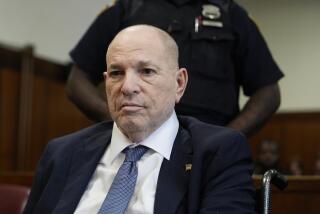Blair to Undergo Procedure for Irregular Heartbeat
- Share via
LONDON — British Prime Minister Tony Blair said he would go into the hospital today for treatment of an irregular heartbeat.
Blair, 51, said the procedure was routine and would not affect his plans to seek a full third term in office next year, a first for a Labor prime minister. However, speaking to the BBC, Blair ruled out serving beyond a third term.
Doctors recommended the procedure, a catheter ablation, in order to correct a tachycardia, or accelerated heartbeat, that has bothered him repeatedly in recent months, Blair said.
Blair disclosed his health problem at the end of the Labor Party’s annual conference, a stressful event at which he acknowledged mistakes in the run-up to last year’s invasion of Iraq and weathered a challenge to his policies from antiwar opponents.
The prime minister also has been trying to patch over divisions between his faction of the party and partisans of Chancellor of the Exchequer Gordon Brown, a friend of 20 years widely believed to want Blair’s job.
In the BBC interview, Blair said it made sense to tell the British people now what his intentions were, both to serve a full third term if elected but “also then to make it clear that you’re not so daft as to think you should be prime minister for ever and ever.” “I think I can still make a real contribution to this country,” Blair said.
In a catheter ablation, a tube is inserted into a vein in the upper thigh and directed to the heart. A wire in the tube is used to destroy a small area of tissue believed to be responsible for the heartbeat irregularity. The procedure takes several hours and has a 90% success rate, medical professionals say.
Blair called it a “routine procedure” and said he expected to be back at work Monday after spending tonight in the hospital and resting over the weekend.
The youngest prime minister in 185 years when he took office in 1997, Blair has appeared to be under strain partly from the intense criticism he has endured for leading Britain into the increasingly unpopular war in Iraq alongside the United States.
Newspapers also have made oblique mention of unspecified family problems for the Blairs, which -- according to some reports -- caused the prime minister to seriously consider whether to relinquish office this year.
However, after a summer vacation in August, Blair returned to work with renewed vigor. He pushed through a long-promised law to ban foxhunting, played host to visiting interim Iraqi Prime Minister Iyad Allawi, pumped London’s bid to host the 2012 Olympic Games, reshuffled his Cabinet and signaled to reporters that he was determined to lead the Labor Party into elections and serve a full term -- stanching rumors that he would step aside in favor of Brown.
In a speech to the party conference in Brighton on Tuesday, Blair spelled out an ambitious progressive agenda for the next four years to bring further reforms to the national health service, add funding to education, increase the number of students in universities, crack down on “antisocial behavior,” and remove the last of the hereditary peers from the House of Lords.
In his remarks on Iraq, Blair said he acknowledged and accepted that Saddam Hussein did not possess chemical or biological weapons as he had believed before the start of the war.
Although he could apologize for that error, he said, he could not “sincerely at least” apologize for removing Hussein from power.
More to Read
Sign up for Essential California
The most important California stories and recommendations in your inbox every morning.
You may occasionally receive promotional content from the Los Angeles Times.










